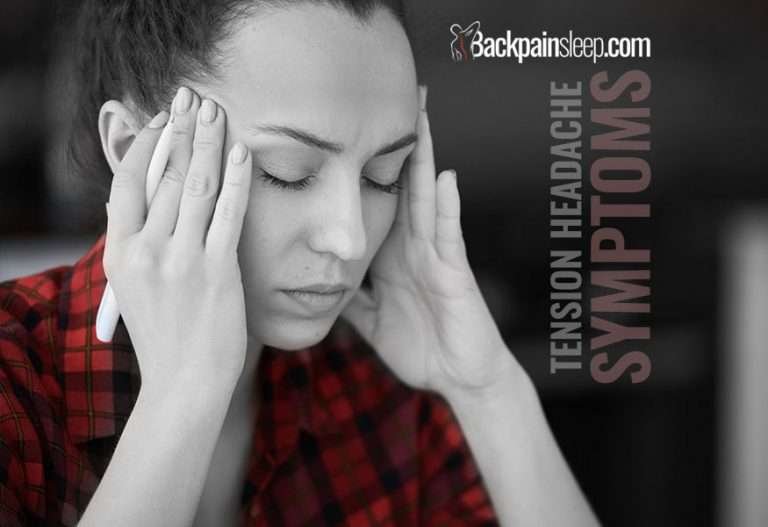Tension headaches afflict everyone. The intensity of pain can vary, with them often described as feeling like a tight, compressing ring of pressure around the head. Tension headaches are by far the most commonplace, yet when it comes to tension headaches cause, they are not that well understood.
There are quite a few different ways to tackle and manage tension headaches, some far more effective, and natural, than others. Changing your pillow and self-massage can be game-changing if you haven’t yet considered them. If you take a look at our growing backlog, you will discover that these are the two simple changes we advocate the most because they can have the biggest impact. Reduce your tension… reduce your headaches.
Signs & Symptoms
Classic signs and symptoms of tension headaches are:
- Headache pain that is constant and aching.
- Feelings of pressure or tightness across your forehead, sides, and back of the head.
- General tenderness in your scalp, neck, and shoulder muscles.
- Tight, stiff jaw muscles.
Tension headaches vs. Migraines
It can be hard to tell tension headaches from migraines when they’re particularly painful. You may also experience migraines if you suffer from frequent episodic tension headaches.
Tension headaches are not usually associated with nausea, vomiting, or visual disturbances and auras like some migraines. While physical activity can aggravate migraine pain, it does not make the pain worse. Tension headaches can cause an increase in sensitivity to light and sound, but these symptoms are not common.
When should you see a doctor?
Get in touch with your doctor if tension headaches are affecting your quality of life or if you are taking medication for your headaches at least two or three times per week. Your doctor will help you pinpoint your tension headache causes and advise you on tackling them.
If you experience headaches often, it’s worth seeing your doctor. Rarely, headaches can signify serious medical conditions, such as a brain tumor or ruptured blood vessel (aneurysm).
When should you seek emergency assistance
These symptoms or signs should be reported to emergency services immediately.
- A sudden onset, severe headache.
- A headache combined with a stiff neck, fever, mental confusion, seizures, or double vision.
- A headache following a head injury can be especially concerning if it gets more severe.


Tension Headaches Cause
With all our advances in medical technology, it’s hard to believe that tension headaches cause are still a mystery to the experts. It’s believed that tension headaches are caused by muscle tension in the scalp, neck, shoulders, and face.
Triggers
The most common triggers for tension headaches are emotional, environmental and physical stress.
Complications
Tension headaches can really impact your quality of life, both personal and professional, especially if they’re persistent.
Prevention
Regular exercise is brilliant at reducing stress. Techniques such as relaxation therapy and biofeedback training can also be beneficial at keeping headaches at bay.
- Training in Biofeedback. This subtle technique helps you control body reactions that can help reduce pain. The subject is connected to devices that give feedback and monitor body functions like muscle tension, heart rate, blood oxygen, and pressure in these sessions. The biofeedback session arms you with the ability to decrease muscle tension, slow down your heart rate, and improve your breathing. Minimizing your tension headache causes.
- Cognitive-behavioral therapy. “Talk therapy” can help you manage stress and reduce the severity and frequency of your headaches.
- You can also try other relaxation techniques. Relaxation techniques such as yoga, meditation, deep breathing, and progressive muscle relaxation can really help headaches. Relaxation techniques can be learned in several ways, online, in classes, or through DVDs and books.
Combining medications with stress management techniques can be more effective for reducing tension headaches.
A healthy lifestyle can make a big impact and help prevent headaches.
- Sleep enough but not too much.
- Do not smoke.
- Regular exercise is an important stress buster.
- Regular, balanced meals are recommended.
- Stay hydrated, drink enough water.
- Reduce alcohol, caffeine, and sugar intake (that’s a tough one)
Diagnosis
Your doctor might conduct physical and neurological examinations if you suffer from chronic or recurrent headaches. These will be used to determine your tension headache causes.
Your description of pain
Describing your headache pain as accurately as possible can help your doctor learn more about your headaches. These details should be included:
- The characteristics of pain. Is your pain constant, sharp, pulsing, or something more stabbing?
- Level of pain. How well you can function when you have a headache is a good indicator of its severity. Is it possible to work? Are your headaches causing you to wake up or keep you from falling asleep?
- Pain location. Do you feel pain all around your head?
Imaging tests
Your doctor may recommend tests for unusual headaches or complex symptoms. These tests can rule out serious conditions. The following are two common ways to take a good look at your brain:
- Magnetic resonance imaging (MRI)An MRI scan combines a magnet field, radio waves, and computer technology to create clear images.
- Computerized tomography A CT scan is a diagnostic imaging procedure that utilizes a series of computer-directed X-rays to render a complete view of your brain.
Treatment
Tension headache sufferers don’t always seek medical attention. They may try to manage their pain themselves. Overuse headaches can be caused by repeated over-the-counter pain relief drugs (OTC).
Acute medication
There are many medications that can be used to relieve the pain associated with a headache.
- OTC pain relief is often the first line of treatment to reduce headache pain.
- Combination medicine. Combining acetaminophen, aspirin, caffeine, or sedative drugs in one medication is common. Combination pain relievers may be more effective than single-ingredient ones. OTC is available in many combination drugs.
- Triptans and narcotics. Triptans can be used to treat migraines as well as episodic tension headaches. However, opiates or narcotics are not recommended due to their potential dependency and side effects.
Preventive medication
If you suffer from frequent or chronic headaches, your doctor may recommend medication to lower the severity and frequency of these attacks.
Some preventive medication options include:
- Tricyclic antidepressants such as amitriptyline or protriptyline are the most common medications used to treat tension headaches. These medications can cause constipation, dry mouth, and drowsiness.
- Anticonvulsants, and muscle relaxants. Anticonvulsants such as Topamax (topiramate) may also be used to prevent tension headaches. Further research is required.
It may take several weeks for a preventive medication to build up in your body before it can start working. Don’t be discouraged if you don’t see any improvement within a few weeks of starting the medication.
Your doctor will keep track of your treatment to ensure that the preventive medication is effective. Overuse of pain relief for headaches can interfere with the effectiveness of the preventive medication.
Lifestyle and home remedies
There are many ways to reduce tension headaches in terms of frequency and severity. A hot shower, ice packs, or a timeout and rest may all be enough to ease tension headaches. Here are some suggestions:
- Reduce stress. Planning ahead is a great way to reduce stress. Relaxation is another way to reduce stress. If you find yourself in stressful situations, take a step back.
- You can choose to go hot or cold. A tension headache can be relieved by using heat or ice to soothe sore muscles. You can heat your muscles with a heating pad, hot water bottle, warm compress, or towel. Hot baths or showers may also be helpful. To protect your skin from cold, wrap an ice pack or frozen peas in a towel.
- Posture. A good posture will help prevent your muscles from tightening. Standing straight up, keep your shoulders back and your head high. Your abdomen and buttocks should be pulled in. Sitting, ensure your thighs and head are parallel to the ground.
Alternative medicine
If you are suffering from tension headache pain, the following non-traditional treatments may be of help:
- Acupuncture. Temporary relief may be possible with acupuncture for chronic headache pain. The needles used by acupuncture practitioners are very thin and disposable, which generally causes little discomfort or pain. The American Academy of Medical Acupuncture website offers referrals to doctors who use acupuncture within their practices.
- Massage. Massage can reduce stress and tension. Massage can be especially helpful in relieving tension and tight muscles around the neck, shoulders, and back. It can provide relief for headache pains.
- Deep breathing, biofeedback, and behavior therapy. Many relaxation techniques can be used to ease tension headaches, such as deep breathing or biofeedback.
Coping and Support
It can be hard to live with chronic pain. Chronic pain can cause anxiety and depression, and a decrease in productivity and quality of life.
Here are some ideas:
- Talk to a counselor/therapist. Talk therapy can help you deal with chronic pain.
- Join a support group. Support groups are a great source of information. Many group members are updated on the most recent treatments. A doctor might be able to suggest a group near you.




